Data Science & AI
Dive deep into data-driven technologies: Machine Learning, Reinforcement Learning, Data Mining, Big Data, NLP & more. Stay updated.
Search inside The Magazine
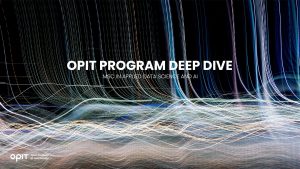
As artificial intelligence (AI) rapidly advances and becomes increasingly important in many industries, students are eager to learn all they can about this exciting, emerging technology. The Open Institute of Technology (OPIT) can help facilitate that process, providing a range of AI-oriented bachelor’s and master’s degree programs, such as the MSc in Applied Data Science and AI.
Introducing the OPIT MSc in Applied Data Science and AI
The OPIT MSc in Applied Data Science and AI is a master’s degree program aimed at graduate students seeking careers in management and tech departments of large or growing businesses. It empowers students with practical skills and knowledge related to its two titular concepts: data science and artificial intelligence technologies.
As with other OPIT courses, this MSc is delivered entirely online, making it a flexible and accessible choice for students from around the world. It can appeal to recent bachelor’s degree graduates or seasoned professionals looking to upskill, broaden their knowledge, or even pursue a possible career transition into a new field.
Once students complete the course, which culminates with a capstone project, they will find a wide range of high-demand, high-salary professional opportunities open up to them. Potential careers utilizing this knowledge include data and AI management, strategic consultancy, and product management. Entrepreneurial students may even elect to start their own companies post-graduation.
Here are the key facts that interested applicants may want to know about this course:
- Duration: Either three or four terms, typically over the course of one year.
- Content: Professional-level instruction on subjects related to the fields of data science and AI, including applied machine learning, big data, and the ethics and regulations of artificial intelligence.
- Focus: Equipping graduates with practical skills and hands-on knowledge to thrive at the intersection of management and tech departments within organizations.
- Format: Online, with a mix of pre-recorded content that students can access on demand, along with a schedule of live lectures.
- Assessment: Progressive assessment, which measures students’ understanding as they proceed through the course, rather than relying solely on tests or final exams. Students will also complete a capstone project.
What You’ll Learn
Students of the MSc in Applied Data Science and AI will begin in the first term by studying foundational applicable courses related to data science and AI. Core topics covered include Python programming for data science, applied artificial intelligence, big data, and cloud computing infrastructure. Students will also gain core project management skills, which may prove vital for their future careers.
In the second term, students will deepen their knowledge with an array of mandatory and elective courses. Mandatory topics covered include business communication skills, research methods, and the ethics and regulation of artificial intelligence. When it comes to electives, students will be able to look into how AI and data science can be used in specific industries, like healthcare, fintech, and public policy.
In the final term, students will put the knowledge they have gained to the test. They will complete their MSc thesis, including a capstone project and dissertation. They’ll work alongside an OPIT supervisor to develop and realize a project proposal, demonstrating their mastery of the topics covered in the preceding terms.
Who It’s For
The MSc in Applied Data Science and AI program can appeal to recent graduates, seasoned professionals considering a career change, or anyone else with a passion for technology or a specific interest in AI and data science. It’s an ideal choice for those who seek to gain a broad level of knowledge of both data and emerging AI technologies, rather than specializing in either one field or the other.
Those who have already obtained a bachelor’s degree in a relevant field will have the best chance of success in this course. As such, it’s well-suited to those who have just graduated from courses like OPIT’s BSc in Digital Business or BSc in Computer Science. Graduates will be able to take their pick from an array of excellent career roles, like Business Intelligence Manager or Chief Data Officer.
The Value of the MSc in Applied Data Science and AI Course at OPIT
Many colleges and universities are starting to offer an increasing variety of degrees and master’s programs related to AI and data science. But OPIT offers a truly unique learning experience that students can’t find anywhere else. Some of the benefits of enrolling in this course include:
- Convenient Online Instruction: The OPIT MSc in Applied Data Science and AI is provided entirely online, which means that students don’t need to worry about traveling to a specific location and the costs and complications that come with that. They can simply access their learning materials on-demand, from the comfort of home. It’s one of the most flexible, efficient ways to learn.
- Valuable, Practical Instruction: Students have long complained about conventional educational systems that demand too much time and focus on knowledge that may have academic value but little practical usage. OPIT takes a different view. Its courses – including the MSc in Applied Data Science and AI – include a strong emphasis on skills and knowledge you can truly use for years to come.
- Leading Lecturers and Strong Support: At OPIT, students have the chance to study and learn from some of the world’s best researchers and tech professionals. Some of the leading lecturers on this course include AI entrepreneur Moez Ali and former parliamentary innovation officer Pierluigi Casale. Students can contact lecturers when they feel the need and participate in communal groups to help and learn from one another, too.
Entry Requirements and Fees
OPIT aims to make high-level technological education as accessible and affordable as possible, inviting students from different backgrounds and walks of life to enroll and take part. The entry requirements are relatively relaxed. Applicants should have a passion for technology and a strong eagerness to learn about data science and the applications of AI, along with:
- A BSc degree, ideally in STEM, but not necessary
- An English language proficiency certificate at level B2
With OPIT’s credit transfer system, you may be able to skip some of the subjects or even an entire term of the MSc in Applied Data Science and AI program, depending on your prior experiences and existing qualifications.
With regard to cost, the full price for this MSc program is €6,750, or €2,250 per term. You can make one payment or pay on a installment basis, and OPIT offers a variety of financing plans and even scholarships to help you manage your payments or potentially reduce the total cost.
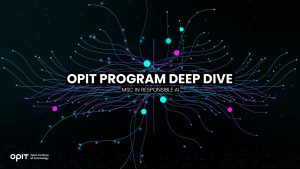
It’s the age of artificial intelligence (AI), and this exciting, extraordinary technology is only going to play an increasing role in our lives as time goes on. As a result, a growing number of ambitious students are eager to master AI today so they’re able to play a bigger part in the AI revolution of tomorrow. And the Open Institute of Technology’s (OPIT) MSc in Responsible AI course is a great way to get started.
Introducing the OPIT MSc in Responsible AI
The OPIT MSc in Responsible AI is a master’s degree program oriented entirely around the subject of AI technology and how it can and should be used in a responsible, ethical fashion. This is a vital subject at the moment, given the increasing importance of AI and the numerous risks associated with how it might be misused or exploited.
Like other OPIT courses, the MSc in Responsible AI aims to equip students with the practical skills and real-world knowledge they need to thrive in their chosen careers. It’s not about inundating students with enormous amounts of information and superfluous details, but empowering them to understand the possible applications and take an active role in the exciting and rapidly evolving AI space.
Also, like other courses in OPIT, they deliver this flexible master’s degree in AI technology entirely online. As a result, students from around the world can participate, with no geographic barriers in their way. Once they graduate, successful students can move on into a range of career paths in fields like AI business strategy, AI entrepreneurship, and AI product management.
Here’s a brief breakdown of what the course entails and what applicants can expect:
- Duration: Either three or four terms, usually over the span of one year.
- Content: The program provides advanced-level instruction on topics oriented around AI technology and how to put it to good use in the digital business world and beyond, while focusing on the course’s core concepts of responsible, sustainable, and ethical usage of AI.
- Focus: Empowering graduates with the relevant skills and hands-on knowledge they need to pursue a career in AI or spearhead initiatives aimed at harnessing AI in responsible, eco-friendly ways.
- Format: Entirely online, with a balanced blend of pre-recorded content – accessible at any time – and live lectures.
- Assessment: A progressive assessment system that measures students’ understanding as they proceed through the course, culminating in a capstone project in the final term.
What You’ll Learn
Students of the MSc in Responsible AI will enjoy the opportunity to massively deepen their knowledge and understanding of AI technology, with a special focus on the ethical implications and challenges that this technology can present. Some of the topics covered during the first term include machine learning and data analytics.
The second term further builds on this, touching on topics like AI in business and entrepreneurship, computing architecture for AI applications, and natural language processing. During this term, students also have the chance to choose one of several elective subjects, allowing them to specialize or learn more about a topic of particular interest to them, like agentic AI or AI for IoT.
The course culminates with the final term – which can also be extended to two segments should the need arise – in which students will be tasked with completing a capstone project and dissertation, putting their acquired knowledge to the test. Students will also benefit from studying under highly regarded researchers and professionals, like AI specialist Zorina Alliata and AI entrepreneur Moez Ali.
Who It’s For
The MSc in Responsible AI program welcomes anyone with a specialist interest or passion for AI technology. It especially suits those who care deeply about the ethical use of technology and want to research or even discover responsible, sustainable ways to employ AI. In short, it’s an appealing choice for the aspiring AI leaders of tomorrow.
Given that this is a master’s program, some level of relevant technical expertise before enrolling is recommended. Graduates may wish to earn their MSc after completing their BSc in topics like computer science or digital business, for instance. Those who succeed in the MSc in Responsible AI may then take on a range of high-demand, high-salary roles, from AI Application Developer to Computer Vision Engineer.
The Value of the MSc in Responsible AI Course at OPIT
Studying for your MSc in Responsible AI at OPIT is, in many ways, a more flexible, enjoyable, and rewarding experience than following a similar course at a conventional institution. Here are some reasons why:
- Exclusively Online: OPIT delivers the MSc in Responsible AI entirely online, meaning students can study from the comfort of their own homes and at their own pace. They’re able to access learning resources as and when they need, which opens up more flexible and convenient study opportunities than the stricter, rigid regimes enforced at traditional universities.
- Hands-On Focus: Conventional education still emphasizes forcing students to learn highly precise mathematical details or memorize extensive reams of text. OPIT takes a different approach, favoring practical, real-world knowledge that you can actually use in your future career. This makes for more engaging and altogether more useful lectures and assessments.
- Strong Support Network: You may be studying from home when you enroll at OPIT, but you never need to feel cut off or isolated from your fellow students. The program makes everyone here feel part of a larger community, offering numerous events like career fairs, support systems, and mentorship programs they can take advantage of. At OPIT, a helping hand is never too far away.
Entry Requirements and Fees
Studying at OPIT is both accessible and affordable. Even in a master’s program like this one, they keep the entry requirements relatively relaxed to allow students from different backgrounds to enroll. While the program recommends relevant experience and qualifications, you don’t necessarily need an extensive tech background to study this course.
Instead, the only criterion you need to meet is:
- A BSc degree, either in a STEM fields or another discipline
- An English-language proficiency certificate at level B2
- A passion for technology (especially AI) and a willingness to learn
OPIT also operates a credit transfer system, which may allow you to skip certain subjects or even one or more terms if you can demonstrate existing expertise or relevant work experience.
In terms of payment, the cost of the OPIT MSc in Responsible AI is €6,750, or €2,250 per term. Students can opt to pay all of this in one go or on a term-by-term basis. There are no hidden charges, and OPIT offers a range of financing options and scholarships to help you cover the costs of your degree in a flexible, convenient way.

Source:
- Raconteur, published on November 06th, 2025
Many firms have conducted successful Artificial Intelligence (AI) pilot projects, but scaling them across departments and workflows remains a challenge. Inference costs, data silos, talent gaps and poor alignment with business strategy are just some of the issues that leave organisations trapped in pilot purgatory. This inability to scale successful experiments means AI’s potential for improving enterprise efficiency, decision-making and innovation isn’t fully realised. So what’s the solution?
Although it’s not a magic bullet, an AI operating model is really the foundation for scaling pilot projects up to enterprise-wide deployments. Essentially it’s a structured framework that defines how the organisation develops, deploys and governs AI. By bringing together infrastructure, data, people, and governance in a flexible and secure way, it ensures that AI delivers value at scale while remaining ethical and compliant.
“A successful AI proof-of-concept is like building a single race car that can go fast,” says Professor Yu Xiong, chair of business analytics at the UK-based Surrey Business School. “An efficient AI technology operations model, however, is the entire system – the processes, tools, and team structures – for continuously manufacturing, maintaining, and safely operating an entire fleet of cars.”
But while the importance of this framework is clear, how should enterprises establish and embed it?
“It begins with a clear strategy that defines objectives, desired outcomes, and measurable success criteria, such as model performance, bias detection, and regulatory compliance metrics,” says Professor Azadeh Haratiannezhadi, co-founder of generative AI company Taktify and professor of generative AI in cybersecurity at OPIT – the Open Institute of Technology.
Platforms, tools and MLOps pipelines that enable models to be deployed, monitored and scaled in a safe and efficient way are also essential in practical terms.
“Tools and infrastructure must also be selected with transparency, cost, and governance in mind,” says Efrain Ruh, continental chief technology officer for Europe at Digitate. “Crucially, organisations need to continuously monitor the evolving AI landscape and adapt their models to new capabilities and market offerings.”
An open approach
The most effective AI operating models are also founded on openness, interoperability and modularity. Open source platforms and tools provide greater control over data, deployment environments and costs, for example. These characteristics can help enterprises to avoid vendor lock-in, successfully align AI to business culture and values, and embed it safely into cross-department workflows.
“Modularity and platformisation…avoids building isolated ‘silos’ for each project,” explains professor Xiong. “Instead, it provides a shared, reusable ‘AI platform’ that integrates toolchains for data preparation, model training, deployment, monitoring, and retraining. This drastically improves efficiency and reduces the cost of redundant work.”
A strong data strategy is equally vital for ensuring high-quality performance and reducing bias. Ideally, the AI operating model should be cloud and LLM agnostic too.
“This allows organisations to coordinate and orchestrate AI agents from various sources, whether that’s internal or 3rd party,” says Babak Hodjat, global chief technology officer of AI at Cognizant. “The interoperability also means businesses can adopt an agile iterative process for AI projects that is guided by measuring efficiency, productivity, and quality gains, while guaranteeing trust and safety are built into all elements of design and implementation.”
A robust AI operating model should feature clear objectives for compliance, security and data privacy, as well as accountability structures. Richard Corbridge, chief information officer of Segro, advises organisations to: “Start small with well-scoped pilots that solve real pain points, then bake in repeatable patterns, data contracts, test harnesses, explainability checks and rollback plans, so learning can be scaled without multiplying risk. If you don’t codify how models are approved, deployed, monitored and retired, you won’t get past pilot purgatory.”
Of course, technology alone can’t drive successful AI adoption at scale: the right skills and culture are also essential for embedding AI across the enterprise.
“Multidisciplinary teams that combine technical expertise in AI, security, and governance with deep business knowledge create a foundation for sustainable adoption,” says Professor Haratiannezhadi. “Ongoing training ensures staff acquire advanced AI skills while understanding associated risks and responsibilities.”
Ultimately, an AI operating model is the playbook that enables an enterprise to use AI responsibly and effectively at scale. By drawing together governance, technological infrastructure, cultural change and open collaboration, it supports the shift from isolated experiments to the kind of sustainable AI capability that can drive competitive advantage.
In other words, it’s the foundation for turning ambition into reality, and finally escaping pilot purgatory for good.
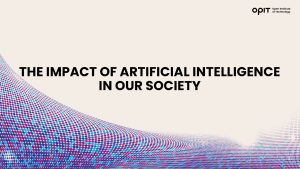
The world has entered the age of artificial intelligence (AI), and this exciting new technology is already changing the face of society in an ever-growing number of ways. It’s influencing a plethora of industries and sectors, from healthcare and education to finance and urban planning. This guide explores AI’s impact on three of the core pillars of life: business, education, and sustainability.
AI in Business: Unlocking Unprecedented Opportunities
In the world of business, the number of uses of AI is growing by the day. Whether it’s in sales, marketing, customer relations, operational optimization, cybersecurity, data management, or some other aspect of organizational life, there are so many ways this technology can unlock new opportunities or expedite existing processes.
Take data as an example. Many businesses now collect and use large amounts of data to inform their decisions in areas like product development or marketing strategy. But they have, up to now, been limited in how they can structure, visualize, and analyze their data. AI changes all that, as it can dig into vast databases with ease, extracting insights to drive actionable decisions in no time.
AI also bridges gaps in communications. It has the power to speak in most major languages, translating audio or written text with astonishing accuracy in an instant. In a globalized world, where many businesses buy and sell with partners, suppliers, investors, and other stakeholders from other nations, AI can help them communicate and exchange information more easily and reliably.
AI in Education: Democratizing and Accelerating the Learning Process
In the educational sector, AI is solving problems that have plagued this industry for generations and transforming the ways in which students learn and teachers teach. It can be used, for example, to personalize a student’s learning plan or adapt content to align with each learner’s favored learning style, making it easier for them to soak up and retain information and skills.
AI’s generative capabilities are also proving useful in the education sector. Teachers, for example, can turn to generative AI models to create lesson plans or supplementary content to support their courses, such as tables, charts, infographics, and images. This all helps to make the learning experience more diverse, dynamic, and engaging for every kind of learner.
On a broader level, there’s clear potential for AI to democratize education across the globe, making learning more accessible to all. That includes those in developing nations who may normally lack opportunities to gain knowledge and skills to achieve their ambitions. If harnessed correctly and responsibly, this technology could elevate education to whole new heights.
AI in Sustainability: Smarter Cities and Next-Level Efficiency
Sustainability is one of the sticking points when talking about AI, as many critics of the technology point to the fact that it involves huge amounts of energy and relies heavily on large and costly data centers to operate. At the same time, AI could also solve many of the sustainability crises facing the world today, uncovering solutions and innovations that may have previously taken decades to develop.
It’s already proving its value in this domain. For instance, DeepMind developed an AI system that was actually able to optimize data center energy efficiency, cutting the amount of energy used to cool data center hardware by a whopping 40% and improving energy efficiency in certain centers by 15%. That’s just one example, and it’s only the start of what AI could do from an environmental perspective.
This tech is also making cities smarter, more efficient, and more pleasant in which to live through AI-powered navigation aids or traffic redistribution systems. It also holds potential for future urban planning, city development, and infrastructure construction, provided the correct systems and frameworks can be established to make the best use of AI’s advantages.
The Ethical Challenges and Risks of AI
Despite its almost countless advantages and possible applications, AI is not without its flaws. This technology brings challenges and risks to go along with its opportunities, and five leading examples include:
- Bias: Algorithmic bias is an issue that has already presented itself during the relatively brief existence of AI so far. Some systems, for example, have issued responses or generated content that could be classified as discriminatory or prejudiced, due to the training data they were given.
- Privacy: There are fears among populations and analysts about the amount of data being fed into AI systems and how such data could be misused, potentially violating people’s rights of privacy and falling foul of data privacy regulations, such as GDPR.
- Misuse: Like so many game-changing technologies, AI has the potential to be used for both benevolent and malicious purposes. It may be used to spread misinformation and “fake news,” influence public opinion, or even in cyber-attacks, for instance.
- Over-reliance: AI is so powerful, with the capacity to carry out tasks with remarkable precision and speed, that it will be tempting for organizations to integrate it into many of their workflows and decision-making processes. But AI cannot be treated as a substitute for human judgment.
- Sustainability: There are also fears about the energy costs associated with AI and the data centers needed to power it, plus the fact that some elements of the burgeoning AI industry may exploit workers in poorer nations worldwide.
Solving These Challenges: Regulation and Responsible Use of AI
With the right approach, it is possible to solve all the above challenges, and more, making AI the most valuable and beneficial new technology the world has seen since the advent of the internet. This will require a two-pronged strategy focusing on both regulation and responsible usage.
Europe is already leading the way in the first aspect. It has introduced the AI Act – a world-first regulatory framework related to artificial intelligence, laying out how it should be used to drive innovation without infringing on the fundamental rights of workers and the larger public.
Educational institutions like the OPIT – Open Institute of Technology are also leading the way in the second aspect, educating people around the world on how to work with AI in a responsible, ethical way, through programs like the MSc in Responsible Artificial Intelligence.
By establishing rules and regulations about AI’s usage and educating the tech leaders of tomorrow in how to work with AI in a fair and responsible way, the future is bright for this exciting and extraordinary new technology.
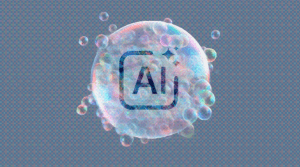
Source:
- Metro, published on October 09th, 2025
After ChatGPT came on the scene in 2022, the tech industry quickly began comparing the arrival of AI to the dawn of the internet in the 1990s.
Back then, dot-com whizzes were minting easy millions only for the bubble to burst in 2000 when interest rates were hiked. Investors sold off their holdings, companies went bust and people lost their jobs.
Now central bank officials are worried that the AI industry may see a similar boom and bust.
A record of the Financial Policy Committee’s October 2 meeting shows officials saying financial market evaluations of AI ‘appear stretched’.
‘This, when combined with increasing concentration within market indices, leaves equity markets particularly exposed should expectations around the impact of AI become less optimistic,’ they added.
AI-focused stocks are mainly in US markets but as so many investors across the world have bought into it, a fallout would be felt globally.
ChatGPT creator OpenAI, chip-maker Nvidia and cloud service firm Oracle are among the AI poster companies being priced big this year.
Earnings are ‘comparable to the peak of the dot-com bubble’, committee members said.
Factors like limited resources – think power-hungry data centres, utilities and software that companies are spending billions on – and the unpredictability of the world’s politics could lead to a drop in stock prices, called a ‘correction’.
In other words, the committee said, investors may be ignoring how risky AI technology is.
Metro spoke with nearly a dozen financial analysts, AI experts and stock researchers about whether AI will suffer a similar fate. There were mixed feelings.
‘Every bubble starts with a story people want to believe,’ says Dat Ngo, of the trading guide, Vetted Prop Firms.
‘In the late 90s, it was the internet. Today, it’s artificial intelligence. The parallels are hard to ignore: skyrocketing stock prices, endless hype and companies investing billions before fully proving their business models.
‘The Bank of England’s warning isn’t alarmist – it’s realistic. When too much capital chases the same dream, expectations outpace results and corrections follow.’
Dr Alessia Paccagnini, an associate Professor from the University College Dublin’s Michael Smurfit Graduate Business School, says that companies are spending £300billion annually on AI infrastructure, while shoppers are spending $12billion. That’s a big difference.
Tech firms listed in the US now represent 30% of New York’s stock index, S&P 500 Index, the highest proportion in 50 years.
‘As a worst-case scenario, if the bubble does burst, the immediate consequences would be severe – a sharp market correction could wipe trillions from stock valuations, hitting retirement accounts and pension funds hard,’ Dr Paccagnini adds.
‘In my opinion, we should be worried, but being prepared could help us avoid the worst outcomes.’
One reason a correction would be so bad is because of how tangled-up the AI world is, says George Sweeney, an investing expert at the personal finance website site Finder.
‘If it fails to meet the lofty expectations, we could see an almighty unravelling of the AI hype that spooks markets, leading to a serious correction,’ he says.
Despite scepticism, AI feels like it’s everywhere these days, from dog bowls and fridges to toothbrushes and bird feeders.
And it might continue that way for a while, even if not as enthusiastically as before, says Professor Filip Bialy, who specialises in computer science and AI ethics at the at Open Institute of Technology.
‘TAI hype – an overly optimistic view of the technological and economic potential of the current paradigm of AI – contributes to the growth of the bubble,’ he says.
‘However, the hype may end not with the burst of the bubble but rather with a more mature understanding of the technology.’
Some stock researchers worry that the AI boom could lose steam when the companies spending billions on the tech see profits dip.
The AI analytic company Qlik found that only one in 10 business say their AI initiatives are seeing sizeable returns.
Qlik’s chief strategy officer, James Fisher, says this doesn’t show that the hype for AI is bursting, ‘but how businesses look at AI is changing’.

Source:
- Times of Malta, published on September 18th, 2025
4 min read
The gathering brought together academics and technology leaders from prominent European Institutions, such as Instituto de Empresa (IE University), OPIT itself and the Royal College of Arts, to explore how artificial intelligence is reshaping the university experience.
The OPIT AI Copilot has been trained on the institute’s complete academic archive, a collection created over the past three years that includes 131 courses, more than 3,500 hours of recorded lectures, 7,500 study resources, 320 certified assessments, and thousands of exercises and original learning documents.
Unlike generic AI tools, the Copilot is deeply integrated with OPIT’s learning management system, allowing it to track each student’s progress and provide tailored support.
This integration means the assistant can reference relevant sources within the learning environment, adapt to the student’s stage of study, and ensure that unreleased course content remains inaccessible.
A mobile app is also scheduled for release this autumn, that will allow students to download exercise and access other tools.
During examinations, the Copilot automatically switches to what the institute calls an “anti-cheating mode”, restricting itself to general research support rather than providing direct answers.
For OPIT’s international community of 500 students from nearly 100 countries, many of whom balance studies with full-time work, the ability to access personalised assistance at any time of day is a key advantage.
“Eighty-five per cent of students are already using large language models in some way to study,” said OPIT founder and director Riccardo Ocleppo. “We wanted to go further by creating a solution tailored to our own community, reflecting the real experiences of remote learners and working professionals.”
Tool aims to cut correction time by 30%
The Copilot will also reduce administrative burdens for faculty. It can help grade assignments, generate new educational materials, and create rubrics that allow teachers to cut correction time by as much as 30 per cent.
According to OPIT, this will free up staff to dedicate more time to teaching and direct student engagement.
At the Milan event, Rector Francesco Profumo underlined the broader implications of AI in higher education. “We are in the midst of a deep transformation, where AI is no longer just a tool: it is an environment that radically changes how we learn, teach, and create,” he said.
“But it is not a shortcut. It is a cultural, ethical, and pedagogical challenge, and to meet it we must have the courage to rethink traditional models and build bridges between human and artificial intelligence.”
OPIT was joined on stage by representatives from other leading institutions, including Danielle Barrios O’Neill of the Royal College of Art, who spoke about the role of AI in art and creativity, and Francisco Machin of IE University, who discussed applications in business and management education.
OPIT student Asya Mantovani, also employed at a leading technology and consulting firm in Italy, gave a first-hand account of balancing professional life with online study.
The assistant has been in development for the past eight months, involving a team of OPIT professors, researchers, and engineers.
Ocleppo stressed that OPIT intends to make its AI innovations available beyond its own institution. “We want to put technology at the service of higher education,” he said.
“Our goal is to develop solutions not only for our own students, but also to share with global institutions eager to innovate the learning experience in a future that is approaching very quickly.”
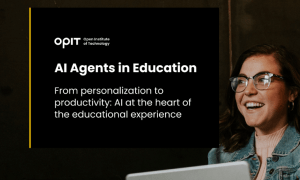
From personalization to productivity: AI at the heart of the educational experience.
Click this link to read and download the e-book.
At its core, teaching is a simple endeavour. The experienced and learned pass on their knowledge and wisdom to new generations. Nothing has changed in that regard. What has changed is how new technologies emerge to facilitate that passing on of knowledge. The printing press, computers, the internet – all have transformed how educators teach and how students learn.
Artificial intelligence (AI) is the next game-changer in the educational space.
Specifically, AI agents have emerged as tools that utilize all of AI’s core strengths, such as data gathering and analysis, pattern identification, and information condensing. Those strengths have been refined, first into simple chatbots capable of providing answers, and now into agents capable of adapting how they learn and adjusting to the environment in which they’re placed. This adaptability, in particular, makes AI agents vital in the educational realm.
The reasons why are simple. AI agents can collect, analyse, and condense massive amounts of educational material across multiple subject areas. More importantly, they can deliver that information to students while observing how the students engage with the material presented. Those observations open the door for tweaks. An AI agent learns alongside their student. Only, the agent’s learning focuses on how it can adapt its delivery to account for a student’s strengths, weaknesses, interests, and existing knowledge.
Think of an AI agent like having a tutor – one who eschews set lesson plans in favour of an adaptive approach designed and tweaked constantly for each specific student.
In this eBook, the Open Institute of Technology (OPIT) will take you on a journey through the world of AI agents as they pertain to education. You will learn what these agents are, how they work, and what they’re capable of achieving in the educational sector. We also explore best practices and key approaches, focusing on how educators can use AI agents to the benefit of their students. Finally, we will discuss other AI tools that both complement and enhance an AI agent’s capabilities, ensuring you deliver the best possible educational experience to your students.
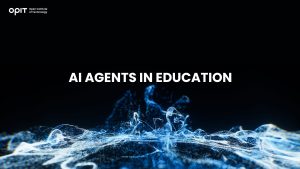
In many ways, the concept of education has remained the same over the millennia – the experienced and learned passing on their knowledge and wisdom to new generations. And some of the biggest revolutions in teaching and learning have been brought about by technology: from the printing press to computers to the internet, they have all changed and democratized the process of teaching and learning. Now, artificial intelligence (AI) is emerging as the next big game-changer.
The emerging role of AI agents in education is the subject of a new e-book released by the Open Institute of Technology (OPIT). Going beyond simple AI tools, such as ChatGPT’s generative AI, the e-book looks at how sophisticated AI agents can be deployed as education allies, both in the general sense and referencing OPIT’s AI Copilot as a specific case study.
So, what can you expect to learn from OPIT’s e-book?
What Are AI Agents?
The e-book starts by explaining the concept of AI Agents. These are AI tools that go beyond simple “if a then x but if b then y” reasoning. Instead, they can work autonomously towards specified goals, with very little need for user intervention. To achieve this, the AI Agent must be able to perceive, make decisions, act, and adapt.
What those four steps look like in action depends on how the AI Agent is employed. Let’s take the example of an AI Agent deployed to deliver IT support, integrated with the IT system’s knowledge and user management system.
The AI Agent will perceive the nature of the problem from requests for help submitted by users, reading and understanding written requests, and also potentially gathering data directly from devices if they are networked. It then integrates this input with its IT system knowledge to understand the nature of the problem and the required solution.
The AI Agent will then decide the best way to solve the problem and plan what steps need to be taken. It should then be able to act. For example, it can verify the user’s identity and begin the password reset process, send detailed information to the user explaining how to solve the problem, or issue a ticket with the important information to the appropriate human IT specialist.
Based on outcomes, the AI Agent will assess its success in completing this task and incorporate that information into its knowledge base.
As well as saving time and money on these tasks, AI Agents can be more efficient, as they work continuously and reduce human error, especially for repetitive and mundane tasks. Scalability is another advantage of AI Agents, as they can be easily scaled up or down when workloads fluctuate.
AI Agents in Education
AI Agents can be deployed in education scenarios to achieve a number of different tasks, which is something that OPIT is doing with its OPIT AI Copilot.
These can be programmed to work as virtual teachers or study assistants that are available 24/7 and deliver personalized learning plans. For example, the OPIT AI Copilot is trained on OPIT’s library of educational content, including over 5,000 lectures and 3,500 hours of video content across 131 courses. From this base, it can show students the content they need to study based on their current stage in the course and answer questions posed by the student through a natural language interface.
If the student is struggling with concepts, the AI Agent can produce alternative learning materials that may work better with the student’s learning style. For advanced students, it can bring in related content that connects to their interests and understanding.
The AI Agent can help students prepare for exams by creating practice tests and issuing grades, even for long-form answers based on factors such as grammatical accuracy and the presence of essential concepts in the response. This kind of immediate feedback has been shown to improve student results over time.
The AI Agent is also useful for teachers, who can use it for grading simple tests and as a fairness check when grading large numbers of more complex papers. It can alert teachers when students are struggling and might benefit from direct intervention, and can identify course materials that are proving problematic for the cohort as a whole, flagging them up for review.
There are many other potential applications, such as creating virtual tours of lost or distant historical sites, virtual discussion moderation, resource gathering for assignments, and organizing references in the required format.
The Benefits of AI Agents in Education
The e-book takes a deep look at both the benefits and potential issues of AI in education. Some of the clearest benefits are personalized learning that moves beyond “one-size-fits-all” approaches and improved accessibility. At the same time, there are concerns around algorithmic bias impacting learning and reduced critical thinking due to over-reliance on AI tools.
But this is why the e-book emphasizes that AI is not a replacement for human teachers, but a tool that can be used to enhance the learning environment. OPIT devotes a chapter to discussing how teachers are becoming curators of dynamic teaching environments that leverage a variety of tools, including AI, to create stimulating and accessible learning spaces.
Essential to this is teaching students how to work with AI, when it is appropriate and when it can be a hindrance, and how to critically assess the content produced and delivered by AI. This is an essential skill for the future as AI becomes more prevalent in every aspect of our lives, and we must critically assess its outputs.
AI Agents Empowering Learning
Overall, the e-book assesses how AI Agents are being leveraged to empower both teachers and students in the education space. The recently released OPIT AI Copilot is one of the examples discussed in the e-book, but it is just the beginning. We fully expect more complex and sophisticated education AI Agents to emerge as the AI Agents, teachers, and students gain a better understanding of their capabilities. It is an exciting time to be in education.
Have questions?
Visit our FAQ page or get in touch with us!
Write us at +39 335 576 0263
Get in touch at hello@opit.com
Talk to one of our Study Advisors
We are international
We can speak in:
